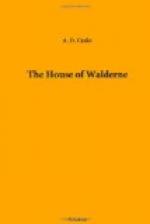26
A proclamation
had just been put forth by the barons, that
all foreigners
should be expelled and lose their property;
and much
violence ensued throughout England, the victims
being often
detected by their pronunciation, as in our
story.
27
How good
to those who seek Thou art,
But what
to those who find!
—Saint
Bernard.
28
It was one
of them who first stabbed Edward the First, when
his queen
saved him by sucking the poison from the wound,
according
to a Spanish historian.
29
Sixty-six
pounds, 13 shillings, four pence; a large sum in
those days.
30
It was afterwards
ascertained that on the very night, the
father,
Roger, dreamt that he saw his son in a gloomy cell,
a slave
condemned to apparently hopeless toil or death, and
addressed
him as in the text.
31
Acre was
stormed by the Moslems, ad 1291, and the Holy
Land
was lost
with it.
32
How unlike
the ceremonial of Hubert’s knighthood! But
the
approach
of a battle justified the omission of the usual
rites in
the opinion of the many.
33
Witness
the case of the Scotch judge—pursued under
divers
forms by
the supposed apparition of a man he had hanged,
until he
died of fright—as recorded by Sir Walter
Scott in
Demonology
and Witchcraft.
34
Whom they
had pelted with mud as she passed under London
Bridge,
calling her a witch. Life of Simon de Montfort,
page
126.
35
Old English
for hence.
36
Parish priests
were frequently styled Sir in those days.
Father meant
a monk or regular, as opposed to the secular,
clergy.
37
His descent
from noble families of either race—Michelham,
the house
of Ella, through his father; Walderne, of ancient
Norman blood,
through his mother, rendered him acceptable to
both parties.



